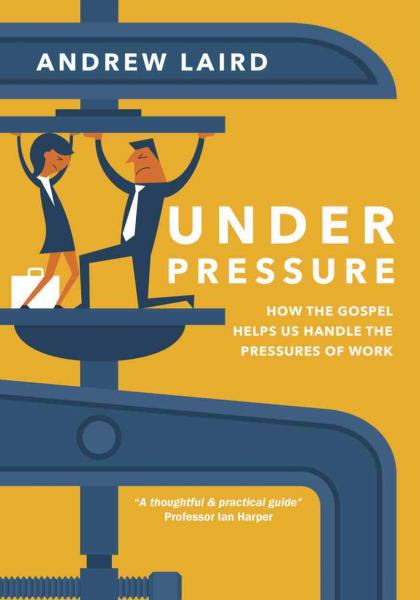Review co-written by Nicola and Steven Naoum
Do you constantly feel pressured in your working (and therefore non-working) life? Do you feel trapped by these pressures? Do you know how to think your way through these pressures, trust God with them, or moreover honour God in them? If you are asking these kinds of questions, Andrew Laird’s new book, Under Pressure; How the Gospel Helps us Handle the Pressures of Work will help.
In his very readable, 107 page book, Laird discusses five causes of the pressure workers experience. He covers how to handle:
- the pressure to have it all
- the pressure of ever-present work
- the pressure of difficult workplace relationships
- the pressure to conform
- the pressure to stay on top of everything.
Each chapter includes helpful, practical suggestions for heart and habit changes. Laird gives small steps to make these changes feel achievable—a true blessing for the worker under pressure who already feels they are failing. The layout of the book means it does not need to be read from front to back; the reader can flick to desired chapters and subsections.

Under Pressure: How the Gospel Helps Us Handle the Pressures of Work
Andrew Laird
Under Pressure: How the Gospel Helps Us Handle the Pressures of Work
Andrew Laird
Underpinning Lairds practical advice is his solid theology. He takes care to provide exegetical depth and biblical insight, which in turn gives the Christian reader great confidence in the merit of his practical methods. He is a reliable source of such insight, being the Director of Life@Work (City Bible Forum), and Dean of the Ridley Marketplace Institute.
The book is clearly for all Christian workers who feel under pressure, but its audience is broader than those who fit into our general idea of “worker”. Laird himself explains that his audience includes those who aren’t necessarily working in an office, and in our opinion the book holds benefit for all of us who feel pressure in the context of any productive endeavour that can be described as work. This means that it has something to say also to students, parents looking after children, and others. Whilst appropriate for the individual, Under Pressure could also be read in a group and discussed in a bible-study-type format. Groups that may particularly benefit from this include those that are industry based.
Whilst Laird has written this book for Christians, it could also be given to non-believers who are struggling under the weight of workplace pressure. Indeed, whilst writing this review we were chatting with a non-believing family member about these kind of issues. With a copy of this book in hand, and having felt it to be a blessing to us already, we were able to offer it to her to have a look. As a non-believer she enjoyed what she read. This is testimony to Laird’s insightful approach to this topic. He writes in such a way that presents creation not in terms of an abstract Christian ideology, but as it really is—a world within which all people (Christian or not) are vulnerable to workplace pressure. He moves from describing the problem (arisen out of this world) to describing the solution (the gospel in all its nuances) with ease—hence why this book provides such a valuable service to believers or non-believers alike.
A book like this could easily make one of two mistakes. The first would be to make the reader feel personally responsible for all the pressure they feel and perceive in their working life. This could be done by suggesting management strategies that assume that all factors are under the individual’s control. The second would be to make the reader feel that they contributed nothing to their experience of pressure. The reality is that within each situation there are multiple factors at play (both internal and external to the person) that result in the experience of pressure. Laird tactfully addresses both types of factors. He does not dismiss the external circumstances outside of one’s control. But he also does not shy away from identifying (sometimes sinful) attitudes within the heart. Finding the fine line between providing challenge where there is choice, and grace where there is not, is rarely done well. But Laird has achieved just this.
There is much to be gleaned from this book. Following is just three of our own reflections, but there are many more to be found within its pages.
First, the necessity, requirement, and blessing of humility is a running theme throughout the book. Humility teaches us that we are mere humans; we are not God. We think: “Of course I’m not God!” But pride is powerfully deceptive (Jeremiah 17:9) and drags us in to believe that we have no limits, like God. That we are all-able, like God. That we can exert all control, like God. That, like God, we don’t need sleep. This just isn’t true. When we try to live as though it is we commence (or continue!) a fight with the natural order of things, with creation itself—a fight we cannot win but will inevitably lose. We are humans, and Laird helps us to further understand why we experience pressure when we choose to ignore this foundational fact.
Humility teaches us that we are mere humans; we are not God.
Secondly, people today frequently change jobs or workplaces. Why? One of the biggest reasons given is “difficult workplace relationships”. Most of us can bring to mind the pressure generated by one of these. As Christians in these situations, we may call to mind Matthew 22:39, “Love your neighbour as yourself”; or something similar. But what does this actually mean and how do we do it? Laird gives a wonderful endorsement from Luke 6:27-28, which includes, “If someone strikes you on one cheek, turn to him the other also”. He explains that in Jesus day this action conveyed insult, rather than assault. Presenting your other cheek means yes you may get slapped again (insulted/humiliated/disrespected etc), but it also allows for another possibility—that your enemy might ‘kiss’ you instead. You make yourself vulnerable within this relationship in order to allow for the possibility of positive change in your enemy, as you hold out both forgiveness and hope for better ways of relating to eventuate. In other words, you love your neighbour.
Thirdly, most of us experience the pressure to “have it all”. Laird suggests that the underlying cause of this pressure is the plethora of choices we live amongst in almost every area of our life. We (the writers of this review) reflected to add that even our “role” in life now involves choice. Role definition is not as clear as decades past (with regards to work, gender roles, parenting roles) so you get to define (choose) it! To have choice is a blessing but there is a catch. There is always something better we could have or something more we could do or something else we could be. The possibilities are endless. And this is our problem.
If we are not able to create our own boundaries, our natural drive to want to “have it all” will end in tiredness, perpetual lack of fulfilment, and even disillusionment.
A century ago the limits to the choices people had meant there were natural boundaries within the system. There was less temptation to try to have it all, because you couldn’t have it all and you knew you couldn’t have it all. Today, there are not as many boundaries within the system (because of all the choices available) and so if we are not able to create our own boundaries, our natural drive to want to “have it all” will end in tiredness, perpetual lack of fulfilment, and even disillusionment. Laird suggests that the primary release-valve for this pressure is a deep understanding that in God, the Christian already has it all. In God, the Christian obtains true and lasting contentment, fulfilment and satisfaction, bringing freedom from this source of pressure.
We recommend this book. It answers the questions it asks, and the questions we are all asking as we face workplaces that put us Under Pressure.












